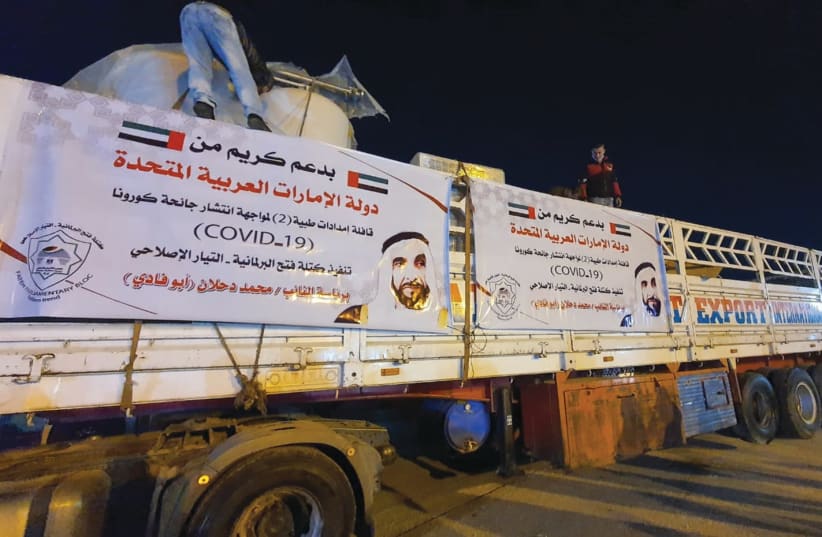Jawad al-Tibi, head of the medical committee at the National Islamic Commission for Development and Social Solidarity, or Takaful humanitarian organization, said the shipment includes an oxygen production plant with all its associated equipment, 30 ventilators, masks and PCR diagnostic tests to combat the novel coronavirus.
Ghazi Hamad, a senior Hamas member and undersecretary at the Ministry of Social Development, said: “We thank the UAE for the generous donation and the Reform movement in Fatah for its contribution in delivering this medical equipment.”
Although the United Arab Emirates has been roundly criticized by Palestinian parties, including Hamas, for normalizing relations with Israel, its medical aid has been accepted without question to help Gaza’s devastated health sector.
“I don’t think that Hamas is thinking of turning down any kind of support, including the UAE aid,” political analyst Mohammad Hijazi told The Media Line. “Hamas receives Qatari cash via Israel itself and receives UAE support at the same time, in spite of the historic enmity between the two countries [Qatar and the UAE]. Hamas has obviously become a pragmatic party that accepts support from anyone regardless of their political positions.”
From another angle, Hijazi also cited the Fatah − Democratic Reform Bloc, headed by Mohammed Dahlan, “and its bodies, most notably the Takaful committee, which has operated in Gaza for a long time and receives support from the UAE and other parties.”
He added, “The UAE with all its infrastructure and housing projects has a significant role on the Gazan scene. Accordingly, the UAE aid is not something new. It’s ongoing in the coastal enclave and has never stopped.”
What is new, according to Hijazi, is the arrival of the shipment from Egypt through Rafah and not via Israel, “which signals the prospect of the UAE expanding its supportive activities in Gaza at various levels.”
“Are there any political motivations behind this? I think it’s quite early to know, but the whole thing is related to the relief activity of the Fatah − Democratic Reform Bloc,” Hijazi said.
THE SHIPMENT, with the first-of-its-kind in Gaza oxygen production plant, will help to mitigate the Strip’s health crisis, reducing the burden placed on the fragile medical system by the pandemic.
Mohammad Abu Selmiya, head of the Emergency Committee in Gaza’s Health Ministry, told The Media Line that “the 14-year-old Israeli blockade on the Gaza Strip has massively affected the economy, social life and, most notably, the Strip’s health sector.”
Abu Selmiya noted that even before pandemic, the Strip had a shortfall of 40% to 50% in essential medicines and a lack of oxygen-producing generators and of spare parts and maintenance for medical equipment.
Things have gotten even worse with the coming of COVID-19, given the fact that the Gaza Strip is one of the world’s most densely populated areas.
“Despite our efforts since last March to delay the arrival of the pandemic through quarantining all returnees to the Strip, it hit us in August, and we’ve encountered tremendous challenges that threaten the functioning of the health care system,” Abu Selmiya said
“For the past four weeks we have been in a seriously critical condition, with all the beds occupied in all the hospitals and a severe shortage of ventilators and oxygen-producing generators,” he added.
There are mini-oxygen production plants in hospitals, but their limited capacity is far outpaced by the heavy consumption of oxygen by COVID-19 patients.
“The oxygen production capacity of European Gaza Hospital [in Khan Younis], for instance, is 700 liters per minute, whereas the actual demand in this hospital exceeds 4,000 liters per minute,” Abu Selmiya said.
The medical aid will not solve the Strip’s health care crisis, but it will at least partially ameliorate its worst effects and provide some much-needed relief for overburdened medical staff.
DR. MOHAMMAD ABU RAYYA, an epidemiologist and health consultant, considers the shipment a timely initiative that will make a difference.
“As we are at the peak of the virus’s outbreak and with the escalating reported numbers of COVID-19 cases and the very limited medical resources and equipment, this shipment has come just in time to save the catastrophic situation,” he told The Media Line.
Abu Rayya expects that the oxygen production plant will “cover a minimum of 80% of the required needs of oxygen for patients, if the epidemiological situation remains stable.”
He praised the role of partial and total lockdowns in curbing the virus’s spread.
“We may hold on for a while if these measures continue, and with the help of some advanced medical technology,” Abu Rayya said.
